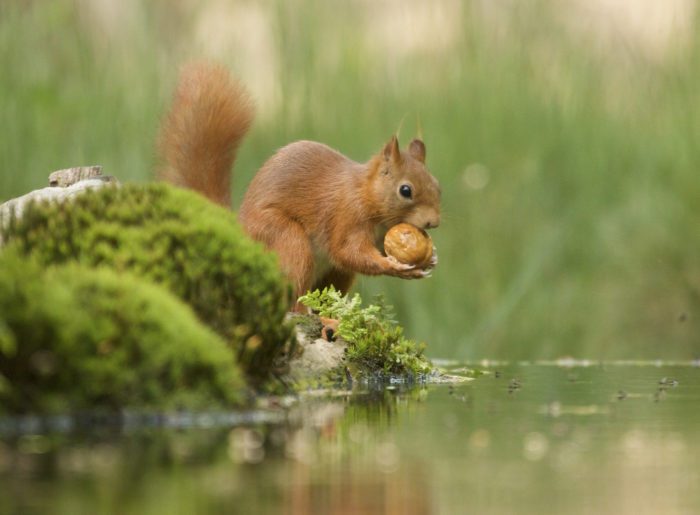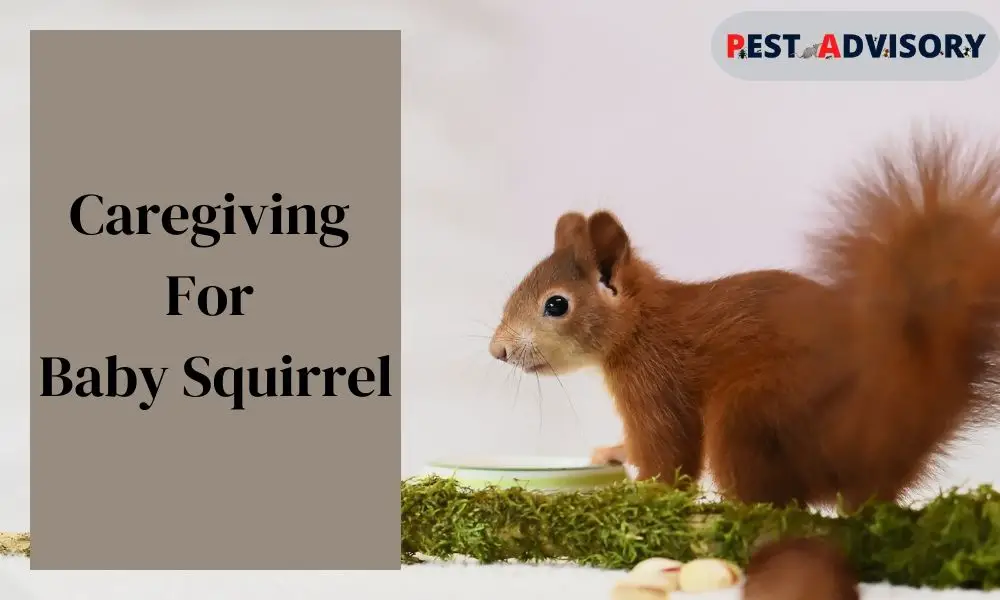Did you come across baby squirrels in your attic? Or your garden? Have you seen the mother squirrel being killed? Are you concerned about how to take care of these babies?
Well, you are at the right place. In this article, we will discuss the dos and don’ts regarding baby squirrels. By the end, you’ll be fully equipped to give preliminary care to baby squirrels.
Squirrels in general are vulnerable creatures. Baby squirrels are more than vulnerable and require lots of care and protection till they become adults.
Important Note: If you're tired of pests and want a reliable solution, then you should definitely consider seeking help from a professional pest control company. DIY solutions can be effective, but if you're dealing with a significant pest infestation, you don't want to rely solely on DIY methods. Pest control companies typically don't charge huge fees. You can fill out this form to receive free quotes from the top local pest control companies, and compare the quotes and see for yourself. Then, finally, your pest problems will be eliminated for good.
Here are some steps that you need to follow to properly take care of baby squirrels.
Note: Only preliminary care. You should hand over baby squirrels to a professional as early as possible.
Baby Squirrels
Baby squirrels are born naked, furless, blind, toothless, and with closed eyes and ears. Their senses open up only after 2-3 weeks. So if you find a baby squirrel with closed eyes, it means it is just born and abandoned.
It requires immediate professional care. Although you can give some care, that is far from enough when it comes to the squirrel’s proper growth.
| Survival Rate | 25 % (In the Wild) 70 % (In Captivity) |
| Growth Rate | 1st Week – Grow Rapidly 2nd and 3rd Week – Doubling their weight 4th and 5th Week – Eyes opening 8-10 weeks – Weaning After weaning, they will continue to grow and develop for several months before reaching maturity. |
| Nutritional Requirements | A diet that is high in fat and protein, and low in carbohydrates |
| Rehabilitation Success Rate | 50% – 70% |
| Disease And Mortality Rate | 25% – 30% |
Suggestions for Safekeeping of Baby Squirrels
Handling of Baby Squirrels
If you see an abandoned baby squirrel, first try to reunite it with its mother. Though it is unlikely the mother will leave the baby willfully and chances are she has met with an accident, still wait for some time before you relocate it from its nest. Keep an eye out for predators. You should stay a little away from the scene so that if the mother returns she will not be scared away by your presence.
But if you do find a single baby squirrel in its nest, then chances are the mother might not return. This is because squirrels give birth in the litter, so if a baby is left alone, without its siblings it might have been deliberately left behind. If even after a long time the baby is alone, only then should you go forward with your version of care.
And if you find the babies at night, then do not leave the baby for the mother. Because squirrels do not venture out of their dreys, away from their young at night.
Squirrels are wild creatures. So never try to handle them with bare hands. They might carry several deadly diseases. And if a baby squirrel is abandoned, chances are it is diseased or injured, and thus, the mother left it. So be cent percent sure to wear thick gloves when you pick out squirrel babies.
If you find yellow dots or flakes in the baby’s body, there are chances that they are eggs of flies and maggots. They should be removed as soon as possible.
Give Them Warmth
Baby squirrels are born naked, blind, and deaf, and they cannot regulate their body temperature until they are around six weeks old. Therefore, it is essential to provide them with a heat source to maintain their body temperature, which should be kept between 95 and 100 degrees Fahrenheit (35-38 degrees Celsius). The warmth helps their metabolism and digestion, and it also stimulates their immune system, which is crucial for their overall health and development.
There are several ways to keep baby squirrels warm. One option is to use a heating pad or a warm water bottle. Wrap the heating pad or water bottle in a towel and place it underneath the squirrel’s nest. Ensure that the heating pad is set to the lowest setting and that it does not cover the entire nest, leaving some space for the squirrel to move around.
Another option is to use a heat lamp, which should be placed a safe distance away from the nest to prevent the risk of overheating or burns. Ensure that the heat source is stable, secure, and not accessible to the squirrel, as they may chew on the wires and cause a fire hazard.
It’s important to check the temperature of the nest frequently and adjust the heat source as needed. The temperature should be warm but not too hot, as overheating can cause dehydration and even death.
In summary, keeping the baby squirrel warm is crucial to their survival and overall health. Providing a consistent source of warmth helps maintain their body temperature and promotes healthy development.
Feeding Them
The second crucial step to taking care of a baby squirrel is to give it appropriate food.
Baby squirrels survive on their mother’s milk for the first few weeks of their lives. Now if they are separated from their mother they still require milk as a staple diet. But the human formula is not to be used.

Since baby squirrels feed frequently you need to rehydrate the abandoned baby squirrel.
So what you do is make a dilute milk solution. Add a pinch of glucose and a drop of curd. Do this only after the baby is warm. From the second feeding onwards you can give it thick undiluted milk with a little bit of curd.
You can feed the squirrel by dropping the solution on its tongue. You can use a syringe or a dropper. Ensure that the baby does not latch on it. Just keep dropping little drops in its tongue till it laps it up. Feed the squirrel a warm solution instead of a cold one.
Tip: Do not use cow’s milk for squirrels, it can get dangerous for them.
Feeding Frequency and Quantity for Baby Squirrels
The feeding frequency and quantity for baby squirrels depend on their age and weight. Newborn squirrels need to be fed every 2-3 hours, while older squirrels can be fed every 4-5 hours. A feeding schedule should be followed to avoid overfeeding or underfeeding the squirrel.
The amount of formula or food given to the baby squirrel depends on its weight. A general rule of thumb is to provide approximately 2-3 milliliters of formula per gram of body weight per feeding. For example, if the squirrel weighs 50 grams, it should be given around 100-150 milliliters of formula per day, divided into several feedings.
It’s important to monitor the squirrel’s weight regularly to ensure they are gaining weight steadily. Overfeeding can lead to diarrhea and other health issues, while underfeeding can cause malnutrition and developmental problems.
When the squirrel is around six weeks old, it can start transitioning to solid food. Introduce small pieces of fruits, nuts, or vegetables, and gradually increase the amount and variety of food over time.
In summary, following a feeding schedule and monitoring the amount and frequency of formula or food given to the baby squirrel is essential for their growth and development. Gradual transitioning to solid food is also important for their dietary needs.
Weaning and Transitioning Baby Squirrels to Solid Food
When baby squirrels are around six weeks old, they can start transitioning to solid food. The process of weaning is gradual and should be done over several weeks to allow the squirrel’s digestive system to adjust.
Start by introducing small pieces of fruits, nuts, or vegetables into their diet, and gradually increase the amount and variety of food over time. Offer these foods in addition to their formula, as they still need to rely on milk for their nutritional needs.
It’s important to monitor the squirrel’s weight and health during the weaning process to ensure they are transitioning well. If they show any signs of diarrhea or digestive issues, cut back on solid food and increase their formula intake.
By the time the squirrel is eight to ten weeks old, it should be fully weaned and no longer need formula. However, it’s still important to provide a balanced and nutritious diet of fruits, nuts, and vegetables to meet their dietary needs.
It’s important to note that some foods, such as almonds or peanuts, should be avoided as they can cause digestive problems or choking hazards. Consult a veterinarian or wildlife rehabilitator for guidance on appropriate food choices for baby squirrels.
Probable Dangers to Baby Squirrels
- Bad weather, especially strong winds, is dangerous for baby squirrels. Unlike adult squirrels, young ones are unable to escape the nest on time and might get blown away.
- Dehydration can be fatal to baby squirrels. They require fluid often. So if you find a baby squirrel alone at night, it means it’s already in grave danger.
- Owing to their vulnerability, often baby squirrels’ furs are infected by maggots and eggs. This leads to various problems in them.
- Due to the lack of glucose in its body, the baby squirrel might have a hypoglycemic seizure. This is evident in the constant arching of its back.
- Emaciation is a situation where the baby squirrel is very thin and weak. It happens when the baby has been orphaned for a couple of days.
- The babies might also be vulnerable to flea attacks.
- Make sure you do not overfeed the baby squirrels. It might result in bloating which is dangerous to babies.
Final Words
If you see a baby squirrel your first thought should be to unite it with its mother. Your second option should be to take it to a veterinary doctor. If both options fail then you come into the picture.
So the basic point to keep in mind while taking care of baby squirrels is to ensure the baby is warm enough and is fed. Make sure it is not carrying maggots or fleas. And if the baby is showing symptoms of the above-mentioned abnormalities, get immediate professional medical help.
Hope this article could shed light upon some of your questions related to the caregiving of baby squirrels.

